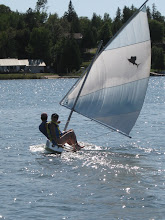I was recently looking for local companies that put on operas in Chicago to audition for when I stumbled upon a group called Da Corneto. Their philosophy is based upon beautiful music and beautiful singing, something that they feel most companies have lost touch with with their flashy or more disturbingly modern productions. They disregard the notion that an opera singer is a "singing actor" and think that they are at most an "acting singer". As such they put on I guess what I would call partially staged productions, no sets, no costumes aside for a few character pieces and minimal staging. They do this to emphasize vocal line and powerful choral and orchestral passages.
This is really mostly interesting because it goes against a current and a call for change in the world of performing opera. Gone are the days where it was permissible to merely stand and sing. You can't just be a singer you must be a powerful convincing actor as well. Audiences simply are not convinced that Lucia goes raving mad while she's standing stark still singing ridiculously complicated ornamentation. So as a result a lot of time and effort on the part of the singer is devoted to convincing acting on top of beautiful singing. Ideally non of the beauty of line or power of the music ought to be lost because of acting or other production values. This does not mean however that this is not sometimes the case.
The death of Pavoratti in some ways marked the end of an era of standing and presenting beautiful music. He never made more than a cursory effort towards acting, and people loved him. He just cared about making beautiful music. So I don't know if Da Corneto is continuing a tradition worth carrying on, whether they are holding on to a tradition of the past, or whether it is simply creating a different operatic performance option for Chicagoans. I do know that it is intentionally turning a blind eye to modern production practices and a modern trend towards believable acting. A trend that I see as good for in many ways, yet can easily slip into trouble.
There is a reason why the fat lady no longer sings. You simply can not make it in the operatic world unless you are of a certain desirable build. Directors frequently ask singers to loose weight, something even more traumatic for a singer than for an actor, because the quality of your voice is intrinsically tied in with your body. So to change the physicality of your body is to change the way that you sound and the way that you need to sing. Tricky business.
Roblox Boys Cothes Free Template
4 years ago

1 comment:
Thought-provoking blog, Embly.
I'm singing for the first time with da Corneto this winter, and we're preparing for a concert of "Aida" this June. I can tell you that they are devoted to getting the sound as BIG AND BEAUTIFUL as possible. I love this approach, and our chorus master is ever the drill instructor. This is very important to me.
However, because of the nature of da Corneto (stand and sing, at least for the chorus), the focus HAS to be solely on the voice. But, as I've also experienced in staged operatic productions through my career, the focus has to be on the singing AND acting. Pavarotti may have gotten away with cursory acting (becuase people DID love his voice over his acting), but for my money, I'd rather see a guy like Placido Domingo on stage: great voice AND great acting.
To me, it all depends on the idiom; I want my four male bohemians in Act IV of 'La boheme' to get wild and crazy (as instructed by Puccini) in the apartment. I don't just want stellar singers to go through the motions and look lethargic doing so.
But, for concert vocal music, the voice MUST be the sole source of the artistic endeavor if the music is translating correctly and beautifully. Da Corneto DEFINITELY adheres to this principle.
Post a Comment